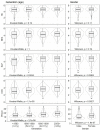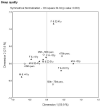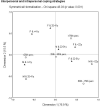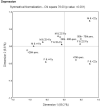The Role of Self-Care Activities (SASS-14) in Depression (PHQ-9): Evidence From Slovakia During the COVID-19 Pandemic
- PMID: 35111721
- PMCID: PMC8801882
- DOI: 10.3389/fpubh.2021.803815
The Role of Self-Care Activities (SASS-14) in Depression (PHQ-9): Evidence From Slovakia During the COVID-19 Pandemic
Abstract
In the ongoing situation, when the world is dominated by coronavirus disease 2019 (COVID-19), the development of self-care programs appears to be insufficient, while their role in mental health may be crucial. The aim of the study was to evaluate the associations between self-care activities and depression in the general Slovak population, but also in its individual gender and age categories. This was achieved by validating the self-care screening instrument, assessing differences, and evaluating the associations using quantile regression analysis. The final research sample consisted of 806 participants [males: 314 (39%), females: 492 (61%)] and data were collected through an online questionnaire from February 12, 2021 to February 23, 2021. Patient Health Questionnaire (PHQ-9) for depression (α = 0.89) and Self-Care Activities Screening Scale (SASS-14) [health consciousness (HC) (α = 0.82), nutrition and physical activity (NPA) (α = 0.75), sleep quality (SLP) (α = 0.82), and interpersonal and intrapersonal coping strategies (IICS) (α = 0.58)] were used as screening measures. Mild depressive symptoms were found in 229 participants (28.41%), moderate depressive symptoms in 154 participants (19.11%), moderately severe depressive symptoms in 60 participants (7.44%) and severe depressive symptoms in 43 participants (5.33%). The main findings revealed the fact that individual self-care activities were associated with depression. This supported the idea that well-practiced self-care activities should be an immediate part of an individual's life in order to reduce depressive symptoms. Sleep quality played an important role, while HC indicated the need for increased attention. Other dimensions of self-care also showed significant results that should not be overlooked. In terms of depression, females and younger individuals need targeted interventions. The supportive educational intervention developed based on the self-care theory can help manage and maintain mental health during a stressful period, such as the COVID-19 pandemic. Health policy leaders should focus on health-promoting preventive self-care interventions, as the demand for them increases even more during the pandemic.
Keywords: COVID-19; coping strategies; depression; health consciousness; mental health; nutrition and physical activity; self-care behavior; sleep quality.
Copyright © 2022 Gavurova, Popesko, Ivankova and Rigelsky.
Conflict of interest statement
The authors declare that the research was conducted in the absence of any commercial or financial relationships that could be construed as a potential conflict of interest.
Figures





References
-
- Rebhun U. Inter-country variations in COVID-19 incidence from a social science perspective. Migrat Lett. (2021) 18:413–23. 10.33182/ml.v18i4.1254 - DOI
Publication types
MeSH terms
LinkOut - more resources
Full Text Sources
Medical

